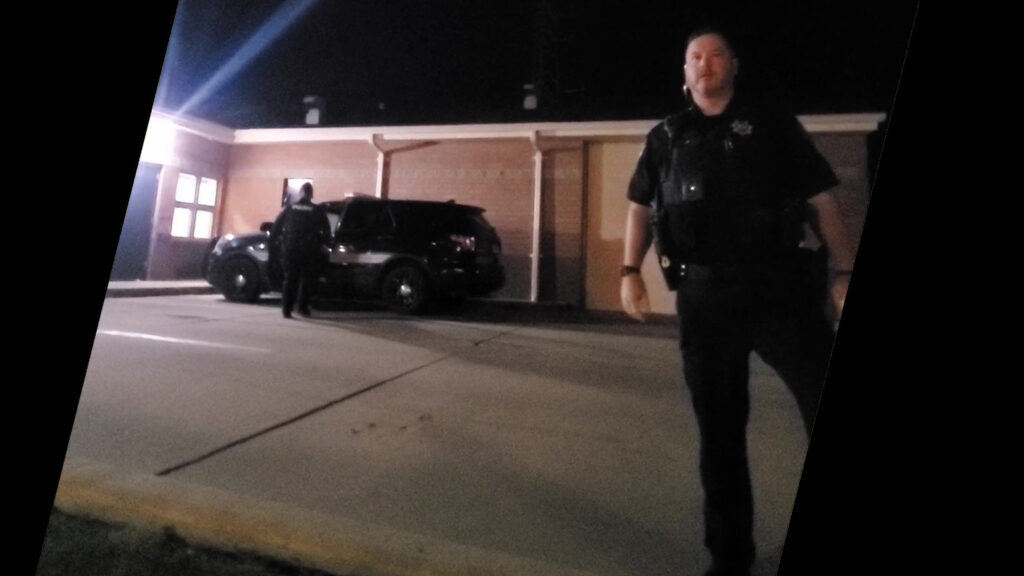
Check CU has recently become aware that Rantoul Police Officers are directing victims of police misconduct to call METCAD 9-1-1 to issue police complaints.
Such a directive occurred on November 7th 2021 after a problematic interaction with Village of Rantoul Police Officer Rikki McComas. When asked about filing a complaint, McComas directed the civilian to use the telephone in the Rantoul Police Department lobby, which connects to METCAD 9-1-1. On followup with McComas’s supervisor, Sergeant Marcus Beach, Beach agreed that directing a civilian complainant to call METCAD 9-1-1 was the correct action.
METCAD 9-1-1 is the primary Public Safety Answering Point (PSAP) serving Champaign County. It is not a service that individual police departments are supposed to use to dump unsuspecting complainants. Understandably, during the November 7th incident, METCAD operators did not understand why anyone would call them to file a police complaint about a particular officer.

I’m a little curious as to where the author became so thoroughly confused in order to arrive at such absurd conclusions. Rantoul Police Department does not have 24/7 front desk staff. If a person wishes to summon an officer (be that a patrol officer or supervisor) to respond to a request for police services, respond to an emergency situation, or yes- even to file a complaint against an officer, that person would need to either contact the front desk staff OR the police department dispatcher – in this case METCAD. During hours when no front desk staff are present, the phone in the police department lobby connects directly to METCAD. An alternate method would be to call the METCAD
non-emergency number: (217) 333-8911, or 911 in the case of an actual emergency from any other phone. Both the lobby phone and the alternate method will achieve the same result. One then has only to explain to the call taker what that person needs so that the appropriate department personnel may be dispatched to assist. In the case of a citizen wishing to file a complaint, METCAD dispatchers will send a supervisor to meet with that person. It’s really very simple.
Did the author expect a patrol officer or supervisor to loiter nearby for an undetermined length of time, just in case something popped up? Does the author expect officers to give him their private cell phone numbers to be at his personal beck-and-call? Perhaps the author of this ridiculous article expects officers to possess some level of clairvoyance so that they should automatically show up whenever the author merely wishes it? Or, is this yet another example of an intentionally slanted and misleading hit-piece designed to incite mistrust and anger towards law enforcement? It’s up to the reader to make up their own mind.
Thanks for your comment. Many localities opt to simply post police complaint forms and instructions on their website, where anyone can access them. Physical copies of complaint forms can also be placed in the police department lobby, where they can be accessed 24/7.
We commend the Village of Rantoul for keeping a publicly accessible “Document Center”, where hundreds of public records are hosted for 24/7 access. However, it is curious that of the myriad of documents available on Rantoul’s website, police complaint forms are not available (Rantoul Police Policies are also, strangely, not available online).
In Rantoul, the only way to get a copy of a police complaint form is to go through a police supervisor in person. This configuration is ripe for abuse, as the supervisor may attempt to talk the complainant out of filing a complaint, refuse/fail to provide the forms, or simply not be available.
After a significant wait time, Supervisor Beach supplied the complaint forms without hesitation or quarrel, and did not do anything to dissuade the filing of a complaint. However, the proposed method of calling METCAD 9-1-1 to initiate the complaint process would seem to be the least efficient path. There does not appear to be any reason that the complainant should have to call or negotiate with anyone before being allowed to have a complaint form.
The Rantoul Police Department could simply make the complaint forms available online, and provide physical copies in their lobby. This would greatly improve public access, and would also allow police officers and their supervisors to operate during their shifts without being interrupted with administrative burdens, such as having to return to the police station to locate/print/fetch forms from the back office.
Sometime prior to Champaign’s Chief of Police Anthony Cobb announcing his resignation, he proposed a survey tool to provide for any police interactions. Cobb’s proposal was pitched as a way for individual police officers to receive feedback of any type directly from persons they police. In no way did Cobb’s proposal suggest an allowance for positive feedback only. Simply, complaints are negative feedback.
Let me entertain your being facetious. At night, I witnessed an interaction between a police officer and a two- sided group of multiple individuals on either side of the middle of the street near their awkwardly parked vehicles. A verbal argument from inside open windows had gradually escalating to open doors and clenched fists. I didn’t make the call to METCAD nor was I conspicuous in observing what was occurring. When the 1st squad car arrived, the police officer got out of his vehicle to engage with the parties. Through their faint dialogue and body language, it became clear the argument developed from one of the vehicles nearly causing an accident not far from where they were standing. By the time a 2nd squad car arrived, the one police officer had effectively separated the parties and had begun deescalated the situation. Accordingly, I could make my way to a phone call from the police department lobby, wait for a supervising officer to arrive, and then ask for a ‘complaint’ form. With some luck, the supervising officer I would receive there waiting, would be the same skilled officer that was dispatched earlier.
Truthfully, a good Rantoul Police department policy wouldn’t limit feedback to complaints; and it certainly wouldn’t make a prospective complainant jump through departmental hoops just to document and submit what gave rise to their concern in the first place.
Here’s a fairly recent documentary exposing the widespread practice, among law enforcement agencies, of inhibiting and discouraging civilian access to the police misconduct complaint filing process, such as we have seen at Urbana and Rantoul (I don’t personally know if other Champaign Cty LEAs are any better):
What Happens When You Try to File a Complaint Against a Police Officer
https://www.youtube.com/watch?v=vnJ5f1JMKns&t=312s
To the commenter who defends the RPD above, why not be brave, meet CHECK CU at least halfway, and admit that Rantoul PD have made their civilian complaint process as obstacle-ridden as possible?
Until recent dedicated activism by concerned citizens such as Christopher Hansen, Tracy Chong, and Emily Klose, the Urbana PD had a similar set-up which had made filing a police complaint close to impossible for most people. Back in 2014-2015, when I personally experienced traumatizing police misconduct by the UPD, I could find no complaint form anywhere on their website, and I was also told that “there is no way to file a police misconduct complaint.”
Although the handful of Urbana reform advocates’ tireless efforts have resulted in some victories for victims of police misconduct wishing to file a complaint (for ex: removal of the unlawful “requirement” that the complaint be notarized), multiple serious impediments remain. These include impossible-to-meet deadlines; no access to the process for complainants who are detained/incarcerated; no trauma-informed awareness of how PTSD (which is going to be present in a high number of cases where actual officer misconduct is a factor) or other related injuries, may affect a complainant’s ability to meet the complaint process requirements. For example, in the case of someone who has experienced police misconduct severe enough to generate PTSD, the process of even describing what happened, the act of just writing out a description, can trigger debilitating, paralyzing, traumatic overwhelm. And there are more issues and complications still to be considered, such as the very real and legitimate fear of retaliation. But I’ll close here, although the conversation needs to continue.
Bottom line: on behalf of Rantoul residents who may feel they don’t have much of a voice here, I’m grateful to CHECKCU for trying to make the Rantoul Police Department more honest.
Not too far away–in StLouis–our police have assaulted threatened and lied about crimes against my family and no one will take a report or respond except to claim that these proveable acts never occurred. As terrifying as it’s been, I’ve made many attempts to go and try to complain. The same happens. I now wear a bodycam whereever I go and am trying still to get help outside of this area. It’s clear there is no one who has any concern here for the law.